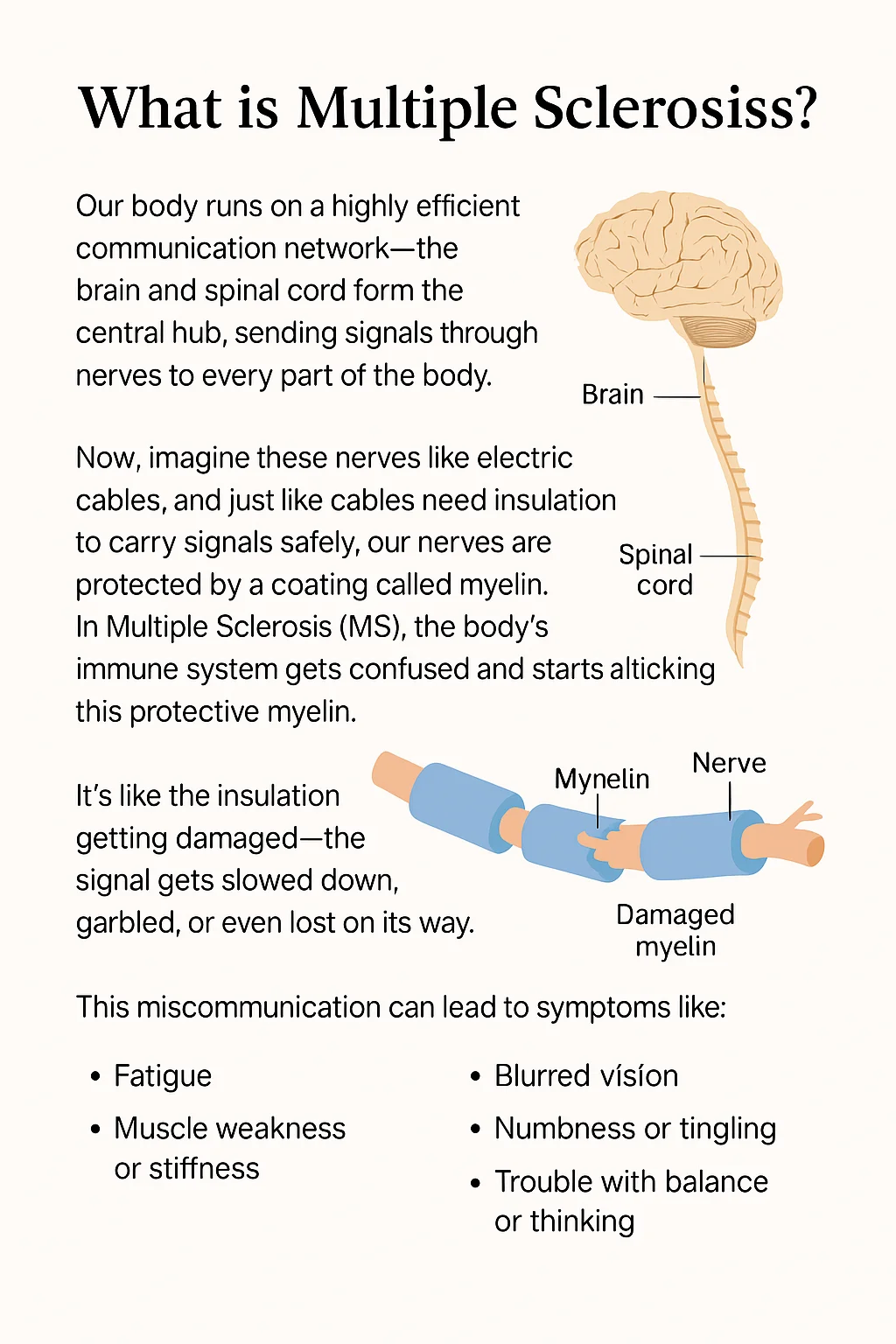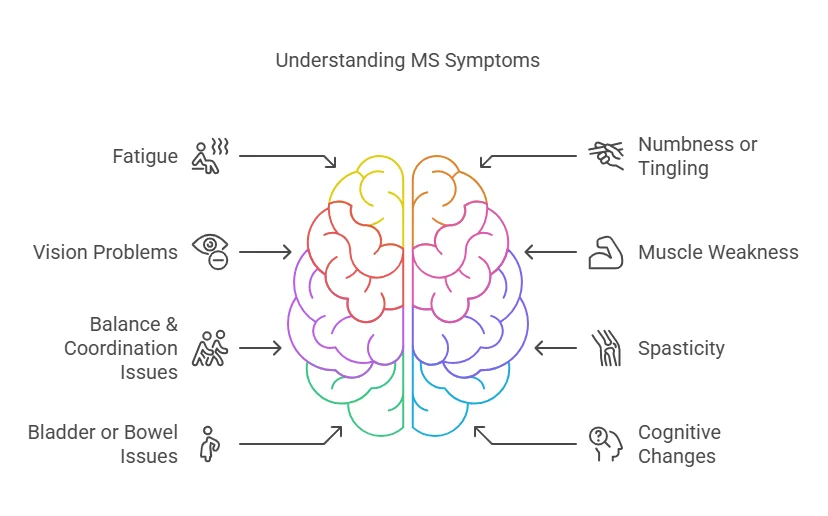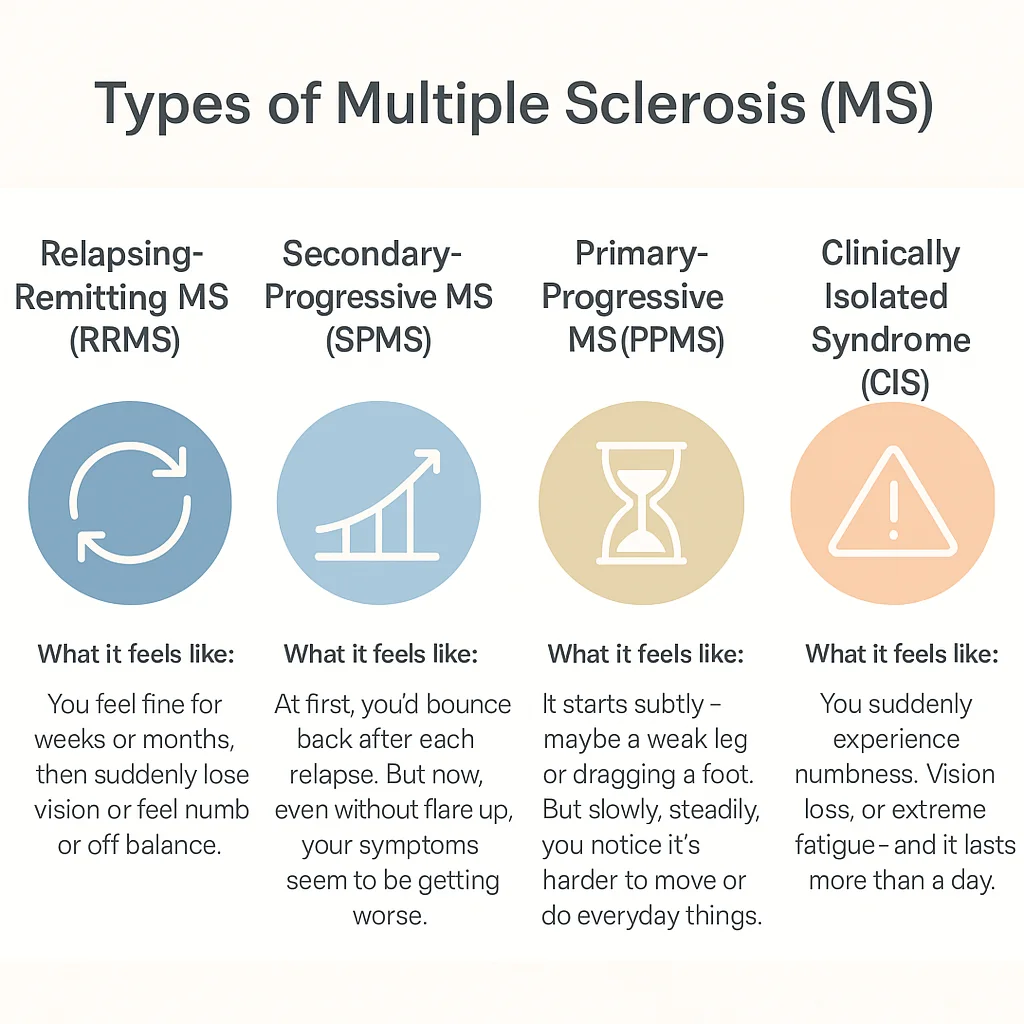Multiple Sclerosis Treatment

What is Multiple Sclerosis?
Our brain and spinal cord are like Wi-Fi routers for our bodies—they send signals through nerves so every part knows what to do.
Our nerves are protected by a coating called myelin. This myelin allows signals to travel quickly and accurately to the required body parts.
In Multiple Sclerosis (MS), the body’s immune system gets confused and starts attacking the protective myelin. Once this protective covering gets damaged, the signals are not conveyed properly to the required body parts.
This miscommunication of signals can lead to symptoms like:
Fatigue
Muscle weakness or stiffness
Blurred vision
Numbness or tingling
Trouble with balance or thinking
MS is a chronic neurological condition, but with the right treatment and care, symptoms can be managed.

Common Signs and Symptoms of Multiple Sclerosis (MS)
Symptoms of multiple sclerosis are sometimes very mild. It is really hard to detect it in the beginning.
When Do MS Symptoms Start?
MS commonly begins between the ages of 20 and 40, though it can appear earlier or later.
MS often starts with symptoms that come on slowly and may get better for a while. Medically, this is known as a flare-up (relapse), followed by a break or recovery time (remission).
How Intense Are the Symptoms?
Early stages: Symptoms may be mild, inconsistent, or mistaken for other conditions (like fatigue, eye strain, or anxiety).
As MS progresses: Symptoms can become more persistent, affecting mobility, vision, coordination, or thinking.
Later stages (in some cases): Disability may increase, but this varies greatly. Some people remain independent for decades, especially with the right treatment.
Symptom Progression Varies Widely
Some people only experience a few symptoms in their lifetime.
Others may face frequent relapses, with partial or full recovery between episodes.
A minority may develop progressive MS, where symptoms gradually worsen without clear relapses.
Not every symptom means MS, but noticing a pattern or sudden changes in how your body feels or works is reason enough to see a neurologist. Early diagnosis and treatment can make a meaningful difference in long-term outcomes.

Types of Multiple Sclerosis (MS)
MS affects everyone differently. The pattern and pace of the disease vary depending on its type. Here’s a simple breakdown to help you understand each form, and what it might feel like for someone living with it.
Relapsing-Remitting MS (RRMS)
This is the most common type, especially in the early stages. It’s marked by clearly defined attacks of symptoms (relapses) followed by periods of recovery (remission).
Secondary-Progressive MS (SPMS)
This often develops after years of having RRMS. Over time, the disease gradually worsens, with or without noticeable relapses.
Primary-Progressive MS (PPMS)
This type involves a steady worsening of symptoms from the very beginning, without clear relapses or remissions.
Clinically Isolated Syndrome (CIS)
This is a one-time episode of MS-like symptoms caused by inflammation or damage in the nervous system. It may or may not develop into MS.

Diagnosis of Multiple Sclerosis (MS)
There is no single test for MS. Instead, doctors use a combination of clinical evaluation, imaging, and lab tests to rule out other conditions and confirm MS. It can take time, but each step brings clarity.
Neurological Examination
The neurological checks are done to check the following:
- Reflexes
- Muscle strength
- Eye movements
- Coordination and balance
- Sensory responses (like touch or vibration)
Why it matters: Subtle signs in your movement or reactions can suggest issues in the brain or spinal cord — the areas MS typically affects.
MRI Scan (Magnetic Resonance Imaging)
This is the most important tool for detecting MS.
An MRI can reveal lesions or “scars” in the brain and spinal cord — evidence of past or current inflammation.
What it feels like: You lie inside a tube for about 30–60 minutes while detailed images are captured. It’s painless but noisy — earplugs are usually provided.
Lumbar Puncture (Spinal Tap)
If the MRI results are unclear, a lumbar puncture may be done.
Doctors remove a small amount of spinal fluid to look for immune system activity seen in MS (like oligoclonal bands).
What it feels like: Local anaesthesia is used; most people feel pressure, not pain. You may need rest after to avoid a headache.
Evoked Potential Tests
These measures how fast and accurately your brain responds to stimuli (visual or electrical).
It helps detect nerve pathway damage that might not cause visible symptoms yet.
What it feels like: Non-invasive, simple, and painless. You watch a screen or feel light taps while your brainwaves are recorded.
Blood Tests
MS symptoms can mimic other diseases like lupus or vitamin deficiencies.
Blood tests help rule out those possibilities before confirming an MS diagnosis.
Multiple Sclerosis Treatment Options Offered By Dr. Shishir in Delhi
While there is no cure for MS yet, there are effective treatments that can slow the disease, reduce relapses, and help manage daily symptoms. Treatment is personalized, based on the type of MS, the symptoms you experience, and your lifestyle needs.
Disease-Modifying Therapies (DMTs)
These are long-term medications that reduce inflammation and slow MS progression. They help lower the frequency and severity of relapses.
Common DMTs include:
- Interferon beta (injections)
- Glatiramer acetate
- Oral meds like Fingolimod, Dimethyl fumarate
- Monoclonal antibodies like Ocrelizumab, Natalizumab
Why it matters: DMTs don’t treat symptoms — they target the underlying immune dysfunction, helping protect the brain and spinal cord.
Managing MS Relapses
Sometimes, despite DMTs, flare-ups (relapses) happen. These need short-term treatments to calm the immune system.
Relapse treatments:
- Corticosteroids (e.g., methylprednisolone): Reduce nerve inflammation quickly.
- Plasma exchange (plasmapheresis): Used for severe attacks when steroids don’t help.
What to expect: These are not everyday medications—they’re used as a rescue plan during sudden symptom worsening.
Symptom Management
MS affects different parts of the body — from muscles to mood. Treating symptoms is crucial to improving daily function and comfort.
Common therapies include:
- Physiotherapy: For mobility, balance, and muscle strength
- Occupational therapy: Helps you adapt daily tasks for independence
- Speech therapy: For slurred speech or swallowing issues
Medications: For pain, spasticity, fatigue, bladder issues, or depression
Lifestyle & Supportive Therapies
Your habits can influence how MS affects you. A holistic approach can help you feel more in control.
- Regular exercise (low-impact, like yoga, swimming)
- Healthy diet (anti-inflammatory, nutrient-rich)
- Stress reduction (mindfulness, meditation)
- Mental health care (counselling, support groups)
- Adequate rest and sleep
Why it matters: These aren’t substitutes for medicine — they are powerful companions that enhance your quality of life.
Emerging & Advanced Therapies
MS research is advancing fast, and the following therapies are being tested worldwide.
- Stem cell therapy (experimental)
- BTK inhibitors (in trials)
- New biologics with better targeting and fewer side effects
MS treatment is not one-size-fits-all. The right plan often combines medication, therapy, and lifestyle choices. With the right support, many people with MS lead long, active, and meaningful lives.
Personalized Multiple Sclerosis Treatment Plans in Delhi
No two people experience MS the same way — and your treatment shouldn’t be one-size-fits-all either. That’s why MS care is personalized, built around your unique symptoms, goals, lifestyle, and stage of the condition.
What a Personalized Plan May Include:
Recovery after a stroke depends on:
A tailored Disease-Modifying Therapy (DMT) regimen to slow progression
Ongoing physiotherapy or occupational therapy to maintain strength and mobility
Support for specific issues like fatigue, spasticity, bladder problems, or cognitive changes
Emotional health support through counselling or mental health therapy
Coordination with your family or caregivers to build a safe, supportive home environment
You’re not just managing a condition — you’re building a strategy to live well with MS.
Why Choose Us for Multiple Sclerosis Treatment in Delhi?
Choosing the right team makes a world of difference when living with a chronic condition like MS. At Dr. Shirhir’s Neurological Clinic, we bring clinical expertise, compassion, and continuity to every step of your journey.
Our goal is simple: to help you live better, move better, and feel supported — every step of the way.
What Makes Our MS Care Different:
- Specialised Neurology Expertise – We stay updated on the latest MS research and treatment breakthroughs
- Advanced Diagnostic Tools – On-site MRI, evoked potentials, and lab support
- Multidisciplinary Support – Access to physiotherapists, psychologists, and rehab specialists
- Patient-Centered Approach – We listen, we adapt, and we walk with you
- Convenient Follow-ups – In-person or tele-consultations tailored to your needs
Life with MS: Support Beyond Medicine
Living with MS isn’t just about medications — it’s about maintaining a good quality of life despite the challenges. We believe in care that goes beyond the clinic.
Holistic Support Includes
Wellness Coaching – Managing fatigue, stress, and emotional shifts
Family & Caregiver Education – Helping your loved ones understand your journey.
Support Groups – Connect with others living with MS
Diet & Nutrition Guidance – Anti-inflammatory diets, weight management
Mental Health Counselling – For anxiety, depression, or adjustment-related stress
You are more than your diagnosis. Our job is to support your whole life, not just your symptoms.
Frequently Asked Questions (FAQs) About MS
No, MS isn’t curable yet. But early diagnosis and modern treatments can slow the disease, reduce relapses, and help you live a full life.
The exact cause is unknown. It’s believed to be an autoimmune reaction, possibly triggered by a combination of genetics and environmental factors, such as viral infections or low Vitamin D.
Sometimes, yes. But in many cases, doctors need repeated tests and time to confirm a diagnosis, especially in the early stages.
It varies. Some people go years between flare-ups, while others may experience gradual worsening. Early and consistent treatment helps delay progression.
Absolutely. With the right support, medications, and lifestyle adjustments, many people with MS work, travel, have families, and live fully.
